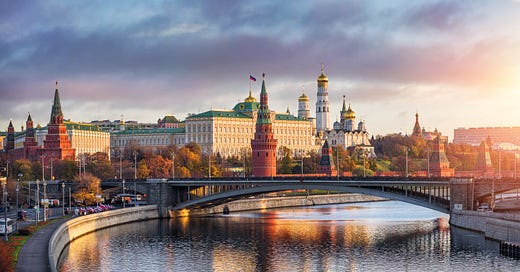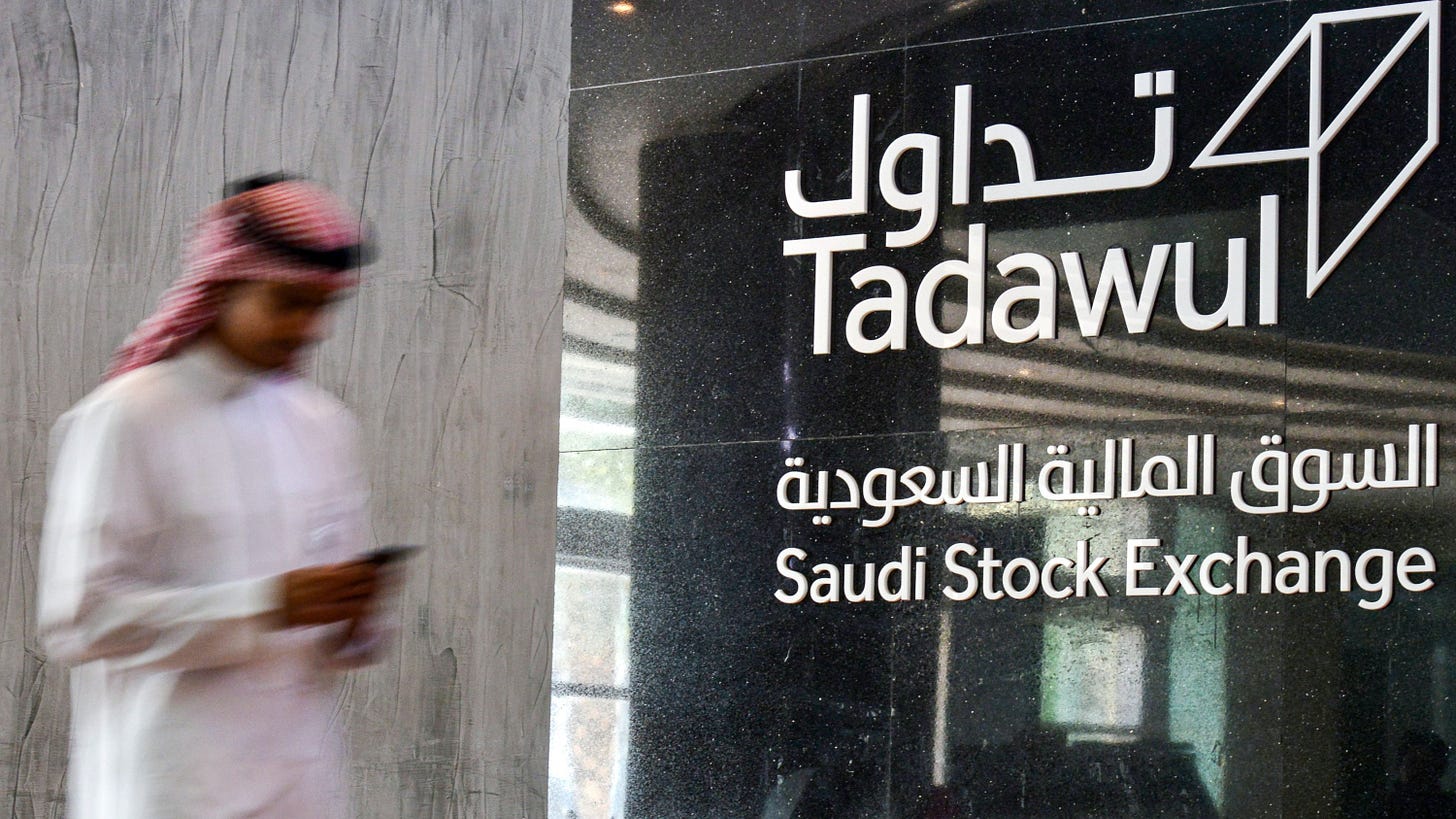Emerging Markets Daily - December 30
Russia's Bull Market vs Ukraine Crisis, EM Left Behind in 'Everything Rally,' Pakistan Seeks New IMF Loan, Saudi Stocks Sizzle, WHO Warns of Omicron 'Tsunami'
The Top 5 Stories Shaping Emerging Markets from Global Media - December 29/30
Toast of Emerging Markets in ‘21, Russia Comes With a Caveat
Bloomberg
“Russia’s performance this past year has made it the toast of emerging markets. But as 2022 approaches, the tens of thousands of Russian soldiers gathered near the Ukrainian border are giving its backers pause for thought.”
“For all the gains the country’s assets have made in the past 12 months, a military incursion into Ukraine would transform the narrative instantly, analysts say. Unprecedented U.S. and European sanctions would leave Russia off-limits to many investors, rendering the benefits of rising commodity prices, record international reserves and the central’s bank’s hawkish turn all but irrelevant.”
“‘If it invades Ukraine, Russia would disappear as an asset class,’ said Elena Loven, a fund manager at Swedbank Robur Fonder AB in Stockholm, which oversees more than 1 billion euros ($1.13 billion) of assets, with the bulk invested in Russia. ‘Sanctions will be imposed and it will be impossible to know what you can and can’t do. At some point, Russia would become uninvestable.’”
“…While the Kremlin insists it has no intention of invading Ukraine, tensions with the U.S. and Europe haven’t been this fraught since the Crimea standoff in 2014. Analysts say the sanctions imposed then would pale in comparison with those currently being mulled in Washington and Brussels, which include harsher limits on Russian banks and exclusion from key international transaction networks such as SWIFT.” Bloomberg reports.
Emerging Markets Left Behind in ‘21 ‘Everything Rally’
Financial Times
“The so-called everything rally triggered by massive fiscal and monetary stimulus has left certain major markets behind while some previous winners have sagged recently, leaving investors to face a more complicated investment landscape in 2022.”
“Governments and central banks have since March 2020 rolled out multitrillion-dollar support packages to soften the economic impact of the pandemic. That nurtured a strong recovery and a record-breaking comeback for financial markets, which has been so broad that some analysts and investors have termed it the everything rally.”
“The MSCI All-Country World index of global stock markets is now on course for its third consecutive year of double-digit returns, its first such hat-trick in at least two decades. Yet some entire asset classes and markets have remained notably more subdued, with UK and emerging market equities standing out as those that have largely missed the party…”
“The MSCI Emerging Markets index started 2021 in fine form, climbing more than 10 per cent in the first two months of the year, but has since been dragged down by Beijing’s regulatory crackdown on several major industries, hurting many stocks that now make up a big chunk of the benchmark. By late December the index was down 5 per cent in 2021, depressing its 10-year gain to 34 per cent, below even the UK FTSE 350 gauge’s modest appreciation.”
“Few see a comeback for the UK, but some reckon emerging markets now look attractive. JPMorgan’s equity analysts think emerging market equities will return 18 per cent in 2022 thanks to a combination of corporate earnings growth and fading fears that the Chinese regulatory clampdown will escalate and broaden. Many investors agree. BofA’s fund manager survey indicated that emerging market stocks are expected to produce the best returns of the coming year.” Robin Wigglesworth reports.
In Political Balancing Act, Pakistan To Raise Taxes In Hopes of New IMF Loan
Nikkei Asia
“Pakistan's government is facing a tough choice: prevent economic default or public outcry that could topple it from power. The government on Thursday submitted a bill to the National Assembly -- a supplementary finance bill that will give Islamabad the right to impose indirect taxes of 360 billion Pakistani rupees ($2 billion).”
“The government is reluctant to have to raise taxes but it needs to do so as a prerequisite to get approval for a $1 billion loan at a Jan. 12 board meeting of the International Monetary Fund.”
“Islamabad was also expected to submit another bill under IMF pressure, called the State Bank of Pakistan amendment. The bill, if passed, will give the central bank more autonomy and allow it to reject government borrowing. The government has not given any hints as to whether this bill will be shelved or submitted later.”
“Ahmed Naeem Salik, a research fellow at the Institute of Strategic Studies Islamabad, said the second bill will give the central bank complete freedom from government involvement for the first time.”
“There had been worries that the indirect taxes could lead to higher prices, which might trigger protests. This comes after the ruling party, Pakistan Tehreek-e-Insaf led by Prime Minister Imran Khan, recently suffered huge setbacks in local mayoral and district elections, as Pakistanis punished the party for inflation.” Nikkei Asia reports.
Saudi Stock Markets Ends Year With Highest Jump in 14 Years
Arab News
“The Saudi exchange has concluded the final trading session of the year with its TASI index hitting the highest annual leap in 14 years, amounting to 30 percent, amid an unending series of pandemic-driven volatility.”
“The latest gains recorded stood at 0.73 percent for the main index TASI which closed at 11,282 points, and 0.09 percent for the parallel market Nomu, edging up to 25,976 points. Most of the Kingdom’s major players ended higher including Al Rajhi Bank, Saudi Aramco, and SABIC, rising to SR142 ($37.82), SR35.8, and SR116, respectively.”
“ACWA Power saw the highest gains of 5.4 percent to close at SR84 — highest since listing, followed by Saudi Research and Media Group, SRMG, and Allied Cooperative Insurance Group, ACIG, which rose almost 5 percent to SR196 and SR23.6, respectively.”
“…Throughout the year, the Kingdom’s major indexes saw unprecedented gains that were driven by a wave of initial public offerings, higher dividends, improving oil markets, promising financial results for companies, and overall recovery from 2020’s pandemic crisis.” Arab News reports.
WHO Warns of Covid ‘Tsunami’ as Omicron Fuels Record Surges
The East African/AFP
“A Covid ‘tsunami’ threatens to overwhelm healthcare systems, the WHO said Wednesday, as record surges fuelled by the Omicron variant dampened New Year celebrations around the world once again.”
“Governments are walking a tightrope between anti-virus restrictions and the need to keep societies and economies open, as the highly transmissible variant drove cases to levels never seen before in the United States, Britain, France and Denmark.”
“The blistering surge was illustrated by AFP's tally of 6.55 million new infections reported globally in the week ending Tuesday, the highest the figure has been since the World Health Organisation declared a Covid-19 pandemic in March 2020.”
"‘I am highly concerned that Omicron, being more transmissible, circulating at the same time as Delta, is leading to a tsunami of cases,’ said WHO chief Tedros Adhanom Ghebreyesus. ‘This is and will continue to put immense pressure on exhausted health workers, and health systems on the brink of collapse.’”
“The variant has already started to overwhelm some hospitals in the United States, the hardest-hit nation where the seven-day average of new cases hit 265,427, according to a Johns Hopkins University tracker.” The East African reports.
“Trust in dreams, for in them is hidden the gate to eternity.” - Khalil Gibran






